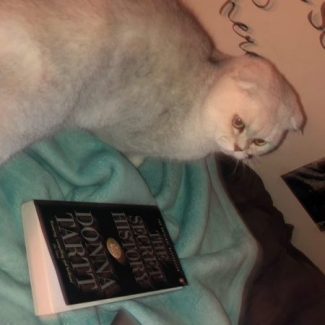As is normal for a student, when you’re constantly analysing university texts left, right, and centre, picking up a book voluntarily is not very common. I too related to this. However, when a four-hour-long hair appointment quite literally forced me to look up from my phone, I refound my childhood love of reading for pleasure as opposed to for papers. Thus, in my first spring semester Bwog meeting, I asked if we could start up a Book Club where we celebrate pieces of literature and share them (in short bursts) with the student population.
So, now you have the first post coming to you from Bwog’s Book Club. I chose to write it on: ‘The Secret History’ by Donna Tartt.
Rating: 4.5/5
Would I recommend? OBVIOUSLY.
A basic outline: Richard, a Californian native with little money to spare, attends a fictional version of Princeton/Bennington to major in Ancient Greek with a select, but highly dysfunctional, group of students. Before you properly meet any characters, you learn that they all play a part in the supposed disappearance and murder of a member of this group, Bunny.
I didn’t expect to enjoy ‘TSH’ at all. Firstly, you’re greeted by a prologue (which I usually regard as a cheat’s way of generating excitement to detract from poor writing). Secondly, the blurb introduces it as a book about “clever, eccentric misfits at an elite New England College” – which is clichéd and doesn’t do ‘TSH’ justice. When I started skimming ‘The Secret History,’ I well and truly had judged it by its cover.
Nonetheless, the plot pulled me in and I began properly reading. The characters, although not necessarily all that relatable, are very believable. You feel like you may as well meet them in Butler, buried under volumes of Ovid and Aristotle in the stacks. Tartt manages to walk the fine line of making her central collection of friends human yet realistically enigmatic. As any good novel should do, ‘TSH’ inspired a series of complicated personal feelings within me while I turned the pages: I was angry at Bunny after his first lunch with Richard, curious about the sexual tension between Camilla and Richard, and slightly in love with Henry simply because he’s the sort of stoic genius who you’d meet in your Lit Hum class and be inexplicably attracted to.
And they live in a world that feels somewhat Gatsby-esque, with castles in the countryside and cigars at dinner, while containing the teenage angst of the early 90s. Yet, this is a world that as just as fragile as James Gatz’s affluent façade, so the reader is constantly on edge waiting for it to become clear as to why Bunny must die.
God, I could go on about this book for ages. All in all, if you’re someone who enjoys works that make you really think, keep you second-guessing, and have an interest in a) classics, b) fiction set in universities, and c) the 90s – READ. THIS. You will not regret it.


 0 Comments
0 Comments
